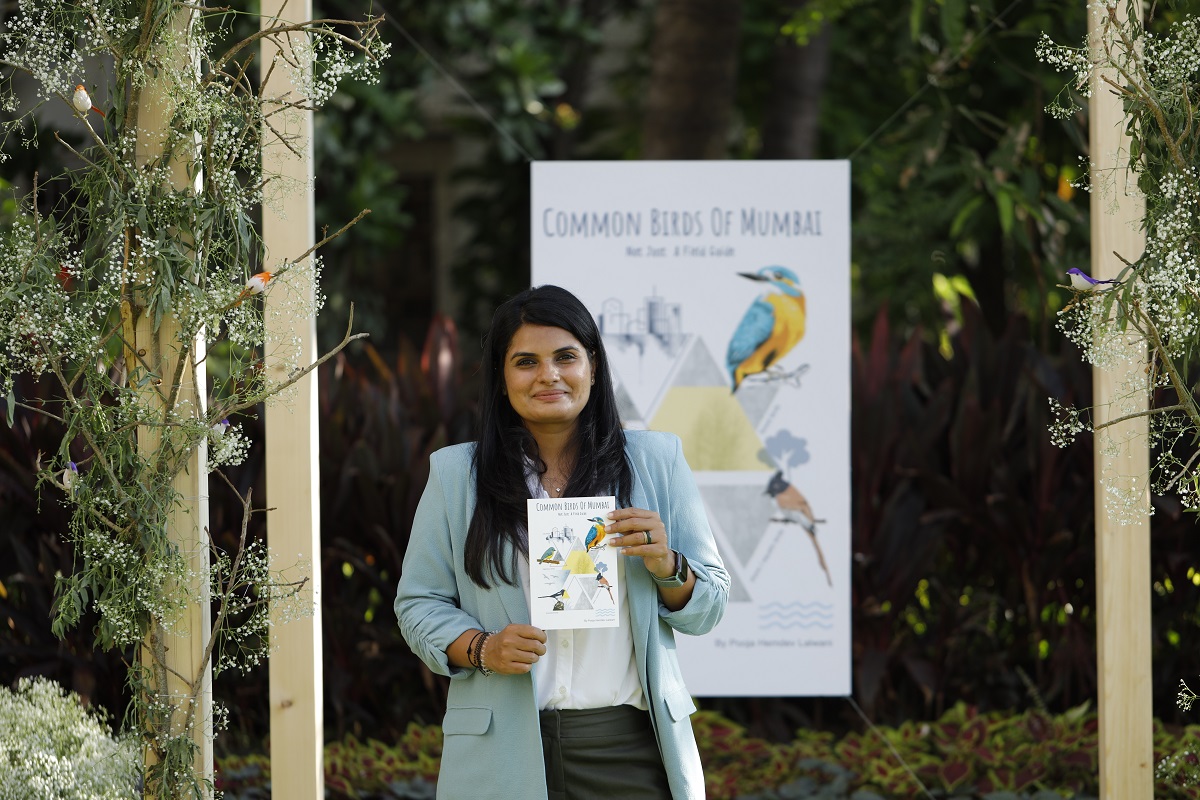Interview with Pooja Hemdev Lalwani, Author, Common Birds of Mumbai. Born into a family of wildlife lovers, Pooja Hemdev Lalwani herself is a biodiversity conservationist.
Q. As we all know your upcoming book is about 174 species of birds we see in and around Mumbai, and it is evident that you yourself are a biodiversity conservationist, what has been so significant about Mumbai birds, that made you write about them? And what made you grow as a biodiversity conservationist?
A: “Mumbai, even though it is a maximum city, is home to the abundant wildlife that goes unnoticed. A wide range of birds reside in the trees that surround our homes, but their beauty and presence are often ignored due to the lack of awareness. I wrote this book to shine a light on the biodiversity that exists in a concrete jungle like Mumbai – in the hopes that it will build some awareness and empathy in the hearts of urban folk and reconnect them with nature. Only after developing a relationship with our local surroundings, will people be motivated to do their part in preserving it – so hopefully this book will act as a stepping stone towards developing a relationship amongst the kids and adults of our city with the planet.”
Advertisement
Q. What made you pursue biodiversity conservation?
A: “Having grown up in a family of wildlife enthusiasts, I have been intrigued by nature since childhood. Being constantly exposed to animals and natural surroundings because of our various little trips outside the city, I automatically developed a strong relationship with the wild. I learned that not many people had the exposure that I did, and soon realised the importance of encouraging more people to develop an empathetic relationship with nature – considering the increasing threat that climate change poses on our planet. I grew up in Mumbai, so I was not aware of the educational possibilities beyond science and commerce, but after studying abroad at the University of Strathclyde in Glasgow, I realised that there was scope in the field that I was so passionate about. After returning to Mumbai, I started developing my dream and looking for ways to work in this field.”
Q: Modern environmental romanticism started a bit late in our country, that may be because of the fact that we as a society are a bit ignorant when it comes to being environment friendly, what are your views on it?
A: “Not only ignorant, but we are also blissfully unaware. Oblivious too, I would say. The effects of global warming and climate change have become more obvious and undeniable, and the impact is now directly affecting our day-to-day lives. That is when I think we finally started taking notice of what we have done to our planet and the billions of species that are affected by our actions. While we speak of this though, you have to give credit to so many people who have always made a conscious choice to lead an environmentally friendly lifestyle – through simple and small changes. Once you start, you realise that it is really not that difficult to do your part. However, as always, there is also a large chunk of our population that chooses to not be concerned with sustainable everyday choices due to various factors that plague us as a population. At the end of the day, though, we must do all we can in our own small capacities. It is like the saying in Hindi, “Boondh-boondh se saagar banta hai”.
Q: Who is your favourite ecopoet?
A: Prerna Singh Bindra.
Q: We see a lot of tokenism these days, do you believe that there are things that seem more perfunctory or symbolic as opposed to showing actual, real efforts?
A: “I would say there’s a mix. A lot of people are doing good work, silently and subtly, not for the recognition but for the good of the planet. But sadly there are also people who consider environmental conservation initiatives as a PR exercise. This is just a sad truth that exists around the world and in all fields of life. The real challenge here is not to try to irradiate concepts like tokenism (because that is out of our control), but is for the consumers to educate themselves – not blindly look at labels and purchase, but do their research and be aware of what kind of consumption is truly ethical.”
Q: What practical and real approach can you suggest to people out there to appreciate the beauty of nature and live a life in harmony with other creatures on this planet?
A: “I would recommend that people get out of their houses more often and really take a minute to look around you. It is very easy for urban folk to get sucked into a robotic lifestyle when just a few kilometers outside your vicinity, you can get to experience a whole new world. I’d recommend that people should spend at least a day in nature every month. Even one day a month – that is all you need to start developing a relationship with the outdoors. And you don’t even need to venture that far out and go on treks if that’s not your style – there are several green spots within the city itself. Visits to places like AareyColony, local parks, etc. are good enough. And it’s a pleasant way to get away from the daily madness too. The more time you spend outdoors, the more you appreciate it – and automatically respect it. I think it’s also important as parents to instil this value and compassion for our environment in our children – after all, the future is them.”
Q- What is your message to people who live in metropolitan cities? How do you think they can explore nature?
A: “Birding is for everyone. It not only helps you sharpen your senses and garner insight into nature but also instills a sense of calm in you which can be quite a meditative experience. People who live in metropolitan cities should definitely have a de-stressing hobby – especially one that reconnects them with nature and reminds them of the beauty of it. We constantly hear news on deforestation, trees being uprooted for development projects and infrastructure. But once you learn that even a city like Mumbai, despite being so urban, is home to rich biodiversity – you will definitely feel the need to do your part to help stop the further destruction of nature.”
Advertisement












